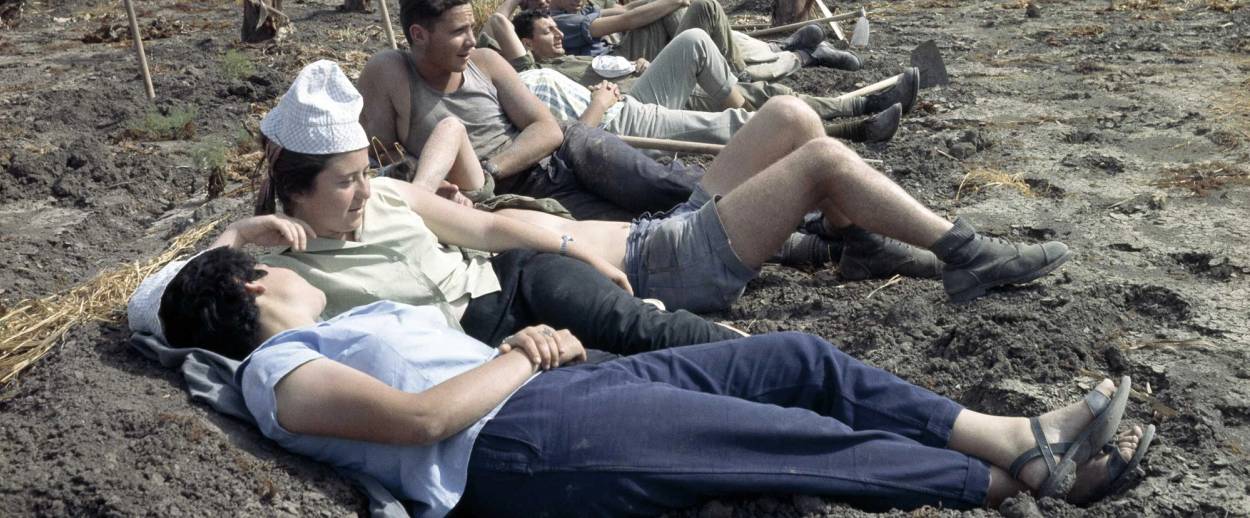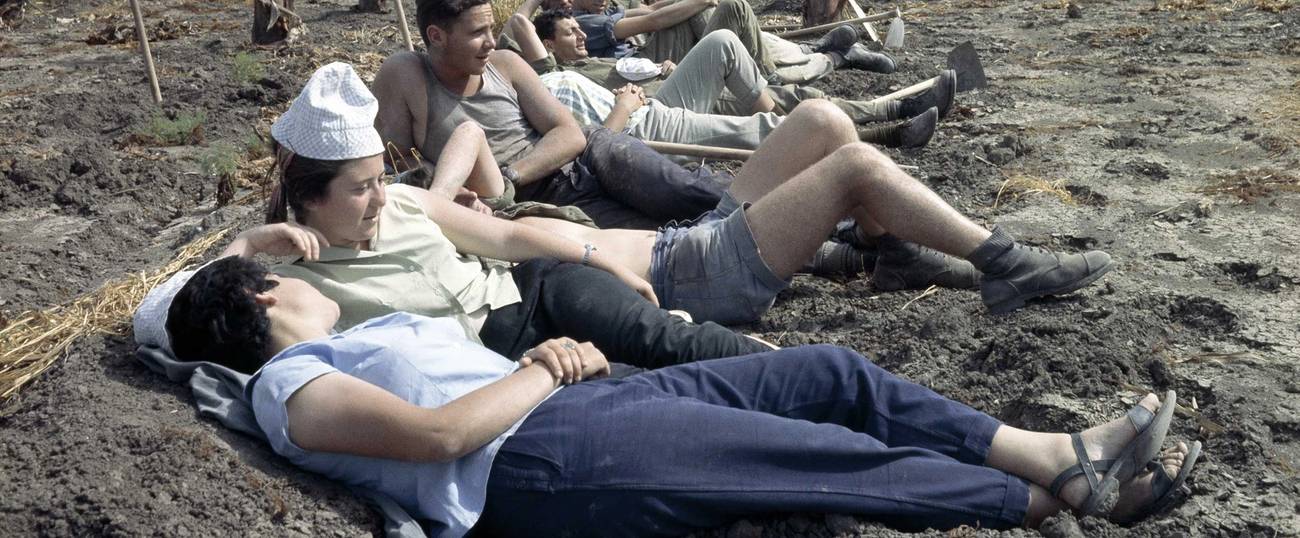Joining the Tribe
Making aliyah in the wake of the Kennedy assassination




I’d been in Israel for less than a month when the news of President Kennedy’s assassination on November 22, 1963, swept through the kibbutz. At first I choked on disbelief, thinking it must be a bad joke. Without instant access to the news (television had not yet come to Israel), it was hard to verify such a horrifying act. Stunned, I ran to the Feins’ bungalow to see what they might have heard on the radio. There, Avram confirmed my worst fears. I listened to the solemn announcement in Hebrew on the station of the Israeli Army radio, Galei-Tzahal, and then in English on the BBC, the most reliable news sources in Israel, each confirming the horrendous truth.
Like a bullet in my own heart, my blood drained as shock turned to despair, then alienation. How could this have happened in my own country, and to a president so revered? The mythical kingdom of Camelot, so artfully constructed by the media, lay in ruins. With the Vietnam War and the Civil Rights Movement looming larger on the horizon, the assassination deepened my disillusionment with American politics. Dissent had always been a cherished political principle in my family. While I admired the way Dad always rooted for the underdog, his constant criticism of American misdeeds at home and abroad left me feeling powerless. Instead of joining protests against unjust causes, I longed to support causes that were just. That was a huge part of Israel’s draw for me. I never questioned the myth of the tiny nation of David beating the Goliath of Arab nations arrayed against it. Here was a noble cause I could embrace.
The assassination of Kennedy made me consider staying in Israel as a real possibility. To make aliyah—literally one who comes up into the land—and become an olah hadasha—a new immigrant—would require changing my visa status from tourist to permanent resident. Under a special agreement between Israel and the U.S., I could become a dual citizen. What did I have to lose?
My idea thrilled the Feins, and I glowed in their approval. Even the earnest Avram smiled warmly, perhaps hoping the seeds he’d planted in an effort to convince Dad of the virtues of kibbutz life had finally germinated. But whether or not I chose to stay on the kibbutz, making aliyah carried a special status in those days (while leaving—making yerida—was tantamount to treason).
However, I doubted my parents would support me as enthusiastically as the Feins. Writing to ask their permission would take weeks. Slowly it dawned on me that having turned eighteen, I was legally an adult. I could make this decision without their consent. With my mind made up, I decided I would let them know only after the deed was done, at which point it would be a fait accompli.
The following week I took a bus to the office of the Interior Ministry in Haifa to begin aliyah paperwork. But when I arrived, a line of applicants from every nation and style of dress extended halfway around the building. A cacophony of languages rose from their ranks. Daunted, I stepped back to survey the scene. Women in long dresses and headscarves stood beside others in sandals and miniskirts; men in loose turbans and dhotis squatted next to guys in T’s and stovepipe jeans. Several Orthodox men wore traditional black suits with the edges of prayer shawls (tzitzit) peeking over the waistbands of their trousers.
I worked my way toward the entrance to ask if this was indeed the line to apply for aliyah. But a gray-bearded man in Orthodox garb blocked the door. A greasy skullcap was bobby-pinned to his wiry gray hair, and a dusting of dandruff covered the threadbare lapels of his black jacket, giving him the look of a goblin or troll.
Running his rheumy eyes over my khaki kibbutz shorts, he waived me away. “Sorry, no appointments today.”
“But, sir . . . there’s still room inside,” I protested, pointing to some empty seats through the smudged window of the waiting room.
“No matter, tavoi mahar,” (come back tomorrow) he insisted, his voice rising.
I felt suddenly self-conscious of my bare legs and freckled arms. Was my outfit not modest enough for his liking? How could he bar me because of my dress? Crushed, I slunk away, vowing to catch the bus at the crack of dawn the following week. On my next visit, I wore a long skirt and blouse with ample sleeves. But I wouldn’t go so far as to cover my head with a head scarf. My secular ulpan friends would have laughed me off the kibbutz! Hoping to outsmart the wolfish little man like one of the three (non-kosher) little pigs, I arrived well before seven a.m. only to find an unruly crowd shoving and elbowing to hold their place in what passed for a line. And there at the office door sat the little man at his rickety table. But I needn’t have worried. When the office finally opened, the surging crowd nearly toppled him. Taking advantage of the stampede, I barged past him, too. Along with my lessons in Hebrew, I was also learning the power of chutzpah—the impudent assertiveness with which Israelis gleefully challenged authority.
The chairs were quickly taken, so I shifted from one foot to the other until I was beckoned to a window at ten o’clock. I shoved my application papers under its bars and held my breath. Peering up at me, the official rose from his chair, adjusted his thick horn-rimmed glasses, and muttered something that sounded like “tea break” before disappearing into a back room as a clock struck ten.
Pandemonium broke out behind me. People shouted, shoved, and shook their fists.
“How dare you take a tea break when we’ve been waiting hours?”
But others were more circumspect. Some even laughed. “Savlanut (patience)!” crowed a man to my left, shaking his upturned palm in a gesture I’d seen before.
After what seemed like forever, the door of the inner sanctum creaked open and the man returned, casually wiping a few stray drops of tea from his beard before plopping into his seat.
“You have your American passport and the two required photos, yes?” he asked in a thick Polish accent. I pushed them dutifully under the grate.
“And are you a Jew?” he asked, as if this were a routine question.
“Of course,” I answered, pointing to the box I’d checked. The form’s only other choices were Christian, Muslim, or Druze, none of which seemed to apply. So I had marked the box that most closely fit my secular identity. I was not so naïve that I couldn’t guess what he was getting at—whether my mother was Jewish—but he hadn’t posed the question directly. Fearing he might prevent me from making aliyah solely because I didn’t comply with the Orthodox definition of a Jew, I didn’t elaborate.
Along with chutzpah, I was also learning not to offer Israeli bureaucrats any more information than they requested. I’d noticed that Israelis practiced a kind of don’t-ask-don’t-tell code, breaking or bending the rules with the motto that it was better to ask forgiveness instead of permission.
Emboldened by this attitude, I felt indignant that my Jewish heritage should be denied just because it happened to have come through my father. After all, according to family lore, my great-grandparents on his side had taken pride in helping to found the secular reform movement in America, a tradition they had brought with them from Vienna to Seattle and later to San Francisco.
I was also learning that one of the many paradoxes of Israeli life was the disproportionate legal power of the religious minority over the secular majority, especially when it came to marriage, divorce, or citizenship. The religious/secular divide was also deeply political, pitting the Orthodox and kibbutz movement, to which Ein Hashofet and Hazorea belonged, against each other. Making aliyah on secular terms, I could identify as an Israeli without religious baggage.
The tension between bumbling bureaucrats and rebellious citizens was another such irony. Many of Israel’s Russian and Eastern European early settlers had learned to outfox the arbitrary rules there—only to perpetuate the byzantine bureaucracy built by the British under the Mandate in Palestine prior to 1948. Thus, the British were the only culprits everyone could agree on. Nevertheless, the habit of challenging authority remained ingrained in Israeli culture.
The sound of the official’s stamp on my documents startled me from these thoughts. With a half-smile, he pushed a small square of paper imprinted with the seal of Israel through the grill. “Congratulations, you’re now an olah hadasha,” he announced for all to hear, then rattled off my ID number just as loudly: 06956338. “You’ll receive your official card in a few weeks.”
Committing the magic numbers to memory in Hebrew, I hurried for the door. The entire process had taken hours, and now I’d have to skip lunch to catch the next bus back to Ein Hashofet in time for my evening shift. My stomach growled even as a wave of triumph rose inside me. I’d made it past the troll of a door-keeper, and the official hadn’t rejected my application.
But I didn’t leave quietly. The bureaucrat’s announcement brought cheers from the crowd of onlookers.
“Mazel tov, gingit,”they yelled.“Baruch Ha’Shem!”(Good luck, redhead. God be praised!)
I felt my cheeks blaze as red as my hair. A room full of nosy strangers didn’t seem to care which half of me was Jewish, secular or religious, as long as I was joining their tribe. Only a huddle of Arab men in dignified robes and checkered red-and-white keffiyehs kept silent as I hurried past them on my way to the exit. Their lined faces and lowered eyes masked their thoughts, but as a nefesh adina, I sensed a deep resentment. Had my celebrated status as an olah hadasha come at the expense of their own rights? Was I a newcomer or an interloper in this ancient land?
Excerpted from Newcomers in an Ancient Land: Adventures, Love, and Seeking Myself in 1960s Israel. Copyright © 2019 by Paula Wagner, published by She Writes Press.
***
Like this article? Sign up for our Daily Digest to get Tablet magazine’s new content in your inbox each morning.
Paula Wagner divides her time between creative writing and career coaching.